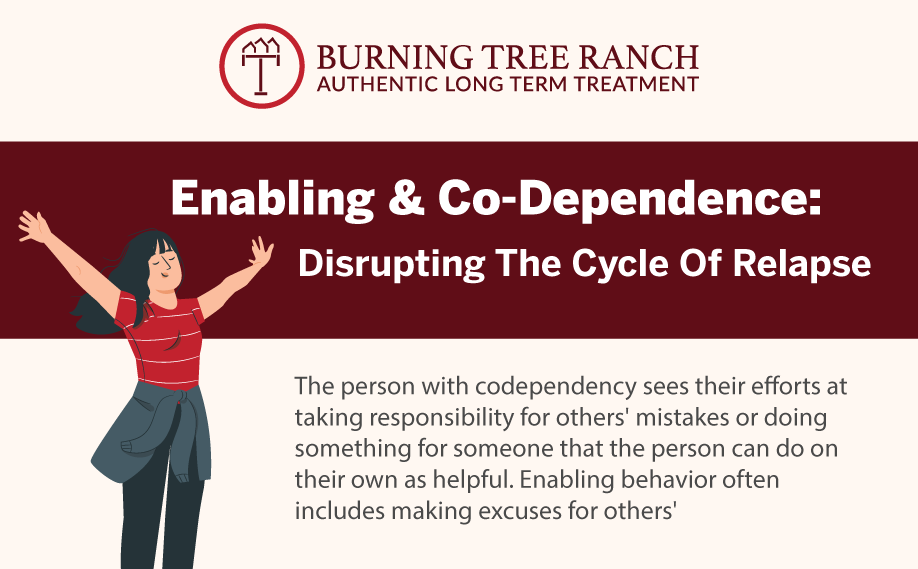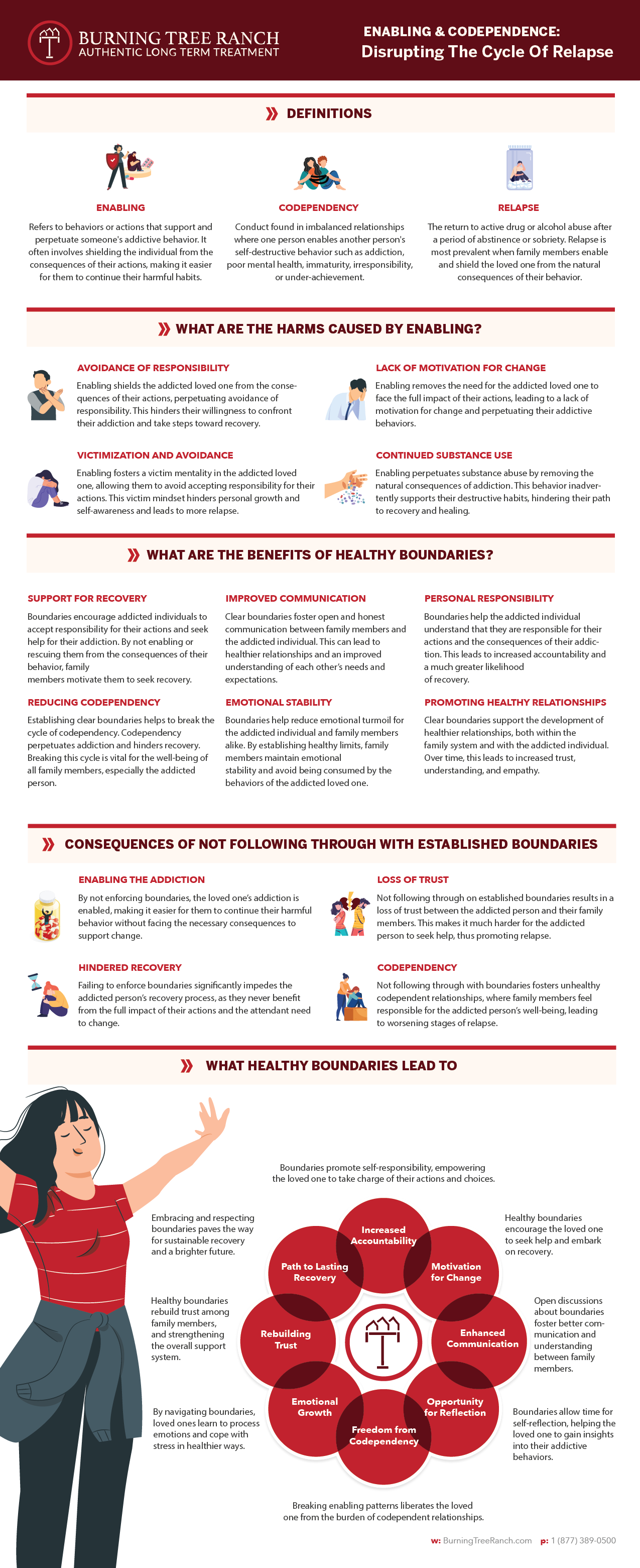The Importance of Family Involvement in Long-Term Treatment Programs
At Burning Tree Ranch, we remain dedicated to every client and every family we serve.
By helping our families make an honest evaluation of what has worked, what has not worked, and what we can do differently moving forward, we share in the common mission of creating a life of excellence beyond sobriety, not only for the addicted loved one, but for the family too.
Relying on the fundamental practice of honesty, we guide parents, siblings, spouses, the addicted loved one, and the entire family system through the life-changing experience of long-term, progress-based treatment.
The way you help heal the world is you start with your own family.

A LETTER FOR FAMILIES FROM THE MOTHER OF AN ALUMNI
Hear first hand experience from Lisa M., the mother of a Burning Tree Ranch Alumnus
Dear Families,
When I started this letter for Burning Tree families I thought about what I would have wanted to hear when I was at the point you are at now. What words of wisdom could someone give me? It wasn’t more addiction horror stories; you’ve experienced that firsthand. My son and I had some harrowing ones and I look back and wonder how we made it through those seven years of setbacks, heartbreaks, and craziness. I assure you it was as bad as it gets; multiple stints in jail, stealing, homelessness and life-threatening injuries and infections. I was willing to do anything to save him without realizing my willingness, my determination, even my love left me open to manipulation and failure. I had to empower myself.
I knew if we continued down this path there were only two endings, long-term incarceration, or death, so I changed my expectations from “fixing” it to just keeping him alive long enough to choose recovery. I gave up trying to make his life normal by keeping him part of family gatherings and talking about going back to school or a new career hoping he would see how great life could be and quit. Yes quit, like it was that easy. I gave up keeping him fed and sheltered. I gave up looking for him when he was homeless and running around like a crazy person fixing his messes, including paying off his debts to preserve his credit rating as if that was the greatest problem he was facing. I committed to keeping him in my life but with boundaries. No more bringing him back to stay at my house, no more money or food or bailing him out of jail but always letting him know I would be there in an instant if he decided to get clean.
I have an MBA, run an $80 million company, been through 4 back surgeries only to become a yoga instructor and I had to finally admit I couldn’t do this; I couldn’t fix his addiction. That one choice, that one decision was critical in leading us to Burning Tree and, even more importantly, sticking to that choice was the difference between success and failure in the program. I had to stop being what I thought was the best parent. That manual, the one none of us ever received when they were born, if it existed and it had a chapter on addiction it would be one sentence…. forget everything you just read about being a good parent. To do what’s best for an addict you have to resist the urge to take care of them, believe what they tell you and give them second, third and fourteenth chances. I never stopped loving him, I never gave up hope and believe it or not I never got angry at him. I held on to who I knew he was but had to be realistic about who the drugs had turned him into. I could no longer deal with him based on the son I had known and loved. I learned to hate addiction.
I realized I was fighting a broken system, in hopes of saving a broken soul, in the midst of a family that was breaking apart and that made me angry. If love and determination alone could save him, I assure you he wouldn’t have needed anything else. I had both in spades. I had to change course as I reached my breaking point. I had to choose to empower myself to save him. That is my best advice to you. Instead of feeling helpless and allowing yourself to be manipulated, take control. If you’re reading this letter, you are at the end of your rope. If your family member is at Burning Tree what you’ve done in the past hasn’t worked. Hand over the wheel to the people that know what works. Play by the rules the staff set and begin to hold your loved one accountable. There is no one better than a recovering addict/alcoholic to see through the bullshit of another addict/alcoholic. They have entered a place where there is no place to hide so don’t you give them one outside of Burning Tree Ranch. The staff are not being cruel or mean by insisting on routine, and hard work, sweat and yes lots of tears. Allow them to be confronted and to confront themselves. Allow yourself to be realistic about this devastating disease and allow Burning Tree to assist you in finally being part of the solution. Let go, your loved one is the right place, this is not your problem alone to solve anymore but you are a critical part of the solution.
What can you do? Be supportive, believe what the staff is telling you and follow their guidance. They are a thousand percent invested in guiding them to recovery and they know what it takes to get there because most of them have been there. Listen to your loved one but don’t try to fix it. Show up for visitation and take the weekly phone calls. What you say, don’t say, do and don’t do can be the difference between recovery and another relapse. Be their lifeline but for once in a healing, helpful way. Take advantage of them being safe and take care of yourself. Attend AL ANON meetings, take a vacation, rest easy. My hope for you is that you are at the beginning of the end of this nightmare. You have committed financially, emotionally and you can help end this. You have paid your dues and it's time for the pay off.
Gerad has been clean and sober for over 3 years, and I am in awe of him. He chose life, he chose to put in the work and give in to something bigger than himself and most importantly he keeps doing the work and so do I. Stay the course that Burning Tree has put them on; support them staying for aftercare and you can get your loved one back and just as important get your own life back. It takes a lot of love and a lot of grace to survive this and come out the other side. You’re on the right path. Stay the course.
~Lisa M.
A LETTER FOR FAMILIES FROM OUR CLINICAL DIRECTOR
Dear Families,
I often meet you after the whirlwind that ends with your loved one arriving at Burning Tree Ranch. I meet you in the space between relief that your loved one made it into long term treatment and fear that they won’t stay long enough to accept the help being offered. It is in this space that our treatment team will begin construction of something new with you. But remember - new construction takes time and growth is sometimes painful.We talk with our families at length about how time is one of our greatest gifts at Burning Tree Ranch. We know that 30-, 60- and 90-day treatments have not worked for our clients. If it did they would have been sober already. While there are people who can get sober in those facilities, our clients just aren’t those people.
When working with families, I often reference this odd form of amnesia that possesses the alcoholic and addict. It is baffling to watch someone be so desperate and distraught after burning it all to the ground and then, sometimes within days, be equally as convicted that they can control it, or it wasn’t that bad. I see families have this same amnesia. Families share the same desperation when trying to get their loved ones to treatment and become equally as convinced that the client is doing well despite a professional clinical team stating otherwise. The client will begin to look better physically, begin to sound better and start to believe that maybe 6 months is long enough. Families will start to question if Aftercare is really that important despite their loved one’s history of doing well in all those other treatment centers only to relapse a short while later.
Early on we begin to talk with families about their participation in the disease and most will, without fail, provide assurances that they are committed to doing what we ask of them. Then, as the client begins to have feelings, to be held accountable, and as their disease begins to ramp up, we will hear families start to defend their loved one, to ask for exceptions; some even begin to question the processes and approaches we have here.
At Burning Tree Ranch, we will ask that you begin participating in treatment the way we believe you need to. We are going to ask that you trust the process and follow the direction of the treatment team. We are going to ask that you attend a series of activities like a Family Workshop, Family Program, etc. and begin participating in Al-Anon. We will begin to confront ineffective family dynamics in real time, even if they are uncomfortable for you. We view this as a life and death errand and frankly, we are okay with you and your loved one being uncomfortable.
What we know to be true is that you love your addict/alcoholic. What we also know to be true is that the disease of addiction takes love and uses it as a weapon. Sadly, we have seen many families literally love their addict/alcoholic to death. At Burning Tree Ranch, we are going to ask that you let go of your control, hand us the reins and follow direction. This will be difficult at times. There will be moments when you may not want to do what we are asking you to do. But even when it's hard, we are going to ask that you support our process - and do it anyway.
We aren’t for everyone and we understand that, but, we do have a way - and it is a way that works.
Sincerely,
Meghan Bohlman, LPC, LCDC, EMDR Trained
Clinical Director - Burning Tree Ranch

OUR FAMILIES DESERVE A TIME AND PLACE TO HEAL

- Al-Anon
- Families Anonymous
- CODA
- Al-Ateen

REALISTIC EXPECTATIONS FOR RECOVERY
At Burning Tree Ranch, we insist that the family unite in a common but separate journey towards wellness. As this process begins, we ask our families to let go of everything they think they know. The purpose of this exercise is to help our families embrace new information, new principles, and a brand-new way of living.

Learn more about enabling & dependency
Our Chronic relapse therapies
Burning Tree Ranch utilizes
addiction medicine to aid in the diagnosis, treatment and recovery of persons with the disease of addiction.
A form of goal-oriented therapy that helps our clients understand how their thoughts affect their actions, leading to healthier thinking patterns and behaviors.
An evidence-based psychotherapy approach that helps our clients better manage stress, regulate emotions, and improve relationships with others.
An interactive psychotherapy
technique that helps our clients reduce the emotional distress caused by the unresolved pain associated with trauma.
An experiential therapy that imparts physical, cognitive, and emotional benefit to our clients as they engage the important work of establishing lifelong recovery.
A form of positive psychotherapy that helps our clients clarify their values and connect with their authentic selves, leading to a greater sense of self-worth and empowerment.
A humanistic form of psychotherapy that helps our clients concentrate on the present moment, and engage the
opportunity to they have increase
personal freedom and fulfillment.
Facilitated by a licensed clinician, group therapy helps our clients develop improved communication skills, boundaries, and self-awareness in a therapeutic setting.
We take into account the whole
person, not just the addiction. Our holistic approach enables our clients to discovery well-being for the mind, body, and spirit.
The goal of individual therapy is to motivate the client to explore certain behaviors that may interfere with, delay, or sabotage the opportunity to achieve permanent, lifelong recovery.
A form of psychotherapy that helps our clients re-build relationships with loved ones, and establish new relationships with a healthy support group of peers.
Neurofeedback Therapy is a noninvasive treatment designed to instruct patients as to how to control brainwave activity in order to change behaviors.
The Twelve Steps teach our clients how to live by a set of spiritual principles that are taught in the Big Book of Alcoholics Anonymous.


